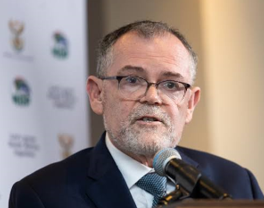
The work of the South African National Parks (SANParks) is now recognised internationally as best practice for inclusive conservation, says Minister of Forestry, Fisheries and the Environment, Dr Dion George.
Through international collaboration, South Africa has strengthened partnerships with the United Nations Environment Programme, the Convention on Biological Diversity, the World Wildlife Fund, and the Global Environment Facility.
“These partnerships ensure that South Africa’s conservation strategies align with global
climate and biodiversity commitments, while leveraging international funding, technical support, and knowledge exchange,” George said on Wednesday, in Gqeberha.George was addressing the inaugural Vision 2040 Indaba on Wednesday, which is intended to foster meaningful dialogue and forge collaborative actions that will advance the implementation of Vision 2040.
The gathering was hosted by SANParks and attended by stakeholders including government, farming communities, civil society, academia, the private sector, land claimant communities and youth representatives. Discussions centred on SANParks' new Vision 2040 strategy, which aims to link biodiversity conservation with social justice and economic empowerment through community participation.
The indaba is designed to drive collaborative actions to implement a people-centred approach to conservation.
George said South Africa is also using the platform of the Group of Twenty (G20) to share its expertise on green finance and the biodiversity economy.
South Africa assumed the G20 Presidency on 1 December 2024. The presidency, which runs until 30 November 2025, is themed: 'Solidarity, Equality, Sustainability'.
“Countries around the world are keen to learn from our model, which links conservation with economic opportunities. From eco-tourism enterprises in remote rural areas to sustainable game meat initiatives that create jobs, South Africa proves that protecting nature can also grow the economy. These lessons are now influencing conservation strategies across Africa, Asia, and Latin America,” the Minister said.
“The G20 Presidency also highlights the role of South Africa as a thought leader in inclusive conservation. Delegations from Europe, Asia, the Americas, and Africa have visited our parks to observe anti-poaching strategies, community engagement initiatives, and ecological restoration programmes.
“These exchanges foster learning, innovation and partnerships that benefit both our country and the international community. Through these global engagements, SANParks has shown that integrated conservation is not just a local necessity: it is a model with international relevance,” George said.
He emphasised that South Africa is demonstrating that protecting biodiversity, empowering communities, and building resilient ecosystems are strategies that benefit nations, economies and the planet.
“South Africa is using the G20 platform to influence global policy, showcase practical solutions, and inspire other nations to adopt people-centred, sustainable and innovative conservation practices.
“The G20 Presidency has also allowed us to highlight the link between conservation and sustainable development. By combining protected area management with inclusive economic growth, we are showing the world that ecological protection is not a luxury.
“It is a necessity for prosperity, social equity, and long-term resilience. SANParks is demonstrating that conservation is both a moral imperative and a practical investment in the future of our people and our planet.
“In short, the G20 Presidency has allowed South Africa to step onto the world stage as a symbol of integrated conservation. It is an opportunity to celebrate our achievements, anchor our vision in a global context, and demonstrate that the future of conservation is interconnected, inclusive, and internationally recognised,” the Minister said.
Twelve months ago, SANParks unveiled Vision 2040, a strategy that marks a decisive shift in how South Africa sees conservation and the role of protected areas in society.
“Vision 2040 is not simply about preserving land or counting species. It is about integrated conservation. It is a deliberate, holistic approach that links ecological integrity, climate resilience, and human well-being.
“It is about reimagining landscapes as Mega Living Landscapes, where protected areas, agricultural land, communal spaces, and private holdings come together in a network that supports biodiversity, sustainable livelihoods, and cultural heritage,” the Minister said.
These Mega Living Landscapes are a powerful departure from traditional conservation models.
“They embody intentionality, co-creation, social justice, inclusivity, and equitable access. They remind us that the environment and people are not separate. They are inextricably connected.
“The well-being of one depends on the thriving of the other. As South Africa positions itself as a leader in sustainable development and environmental stewardship, SANParks is at the forefront,” the Minister said.
This year, Vision 2040 has been implemented through addressing the urgent threat of rhino poaching, fighting illicit wildlife crime, protecting life and livelihoods, elevating three of South Africa’s national icons into global leaders in conservation, ecological protection, and inclusive tourism and promoting SANParks at the G20. - SAnews.gov.za
No comments:
Post a Comment